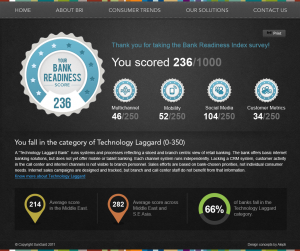When SunGard teamed up with analyst firm Celent to develop the Bank Readiness Index survey, it exposed weaknesses in the way banks cater to their digitally driven customers. Wissam Khoury, Managing Director, SunGard Middle East, discusses the results of the Index survey and how SunGard has reacted by producing cutting edge solutions to help banks keep pace with the fast-emerging environment in order to serve evolving expectations.
The Bank Readiness Index (BRI) was designed so that banks could readily discover the extent of their abilities to cater to their customers’ needs. The banks answered a series of questions based on their mobility, customer metrics, multichannel availability and social media use. They were then shown immediate results giving them an insight into their current customer experience.
After gathering the results, SunGard quickly noticed that many banks were not keeping up with the needs of their customers and in particular, the Middle East region was lacking behind other regions in terms of meeting changing customer demands and preferences.
The survey results showed a distinct lack of mobile and Web availability despite the fact that the region boasts nearly 90% connectivity and mobility, suggesting that the banking and financial services were not effectively tapping in to the digital market.
“We did not find the results that surprising, as it is clear that the increasing adoption of mobile devices and the explosion of interest in social networks such as Facebook and Twitter – both globally and regionally – is rapidly changing the way that customers look at their service providers,” says Khoury.
“While consumer brands can quickly adopt new channels to engage with their target audiences, it is much more challenging for banking and finance service providers to keep pace and, given obvious concerns around security of information, banks are finding it more difficult than most.”
Khoury believes that banks haven’t shown a lack of enthusiasm towards the developing market or their customers. He thinks that in a rapidly changing, technical environment banks are hesitant to implement the latest solutions in fear that they may quickly become redundant, and therefore a wasted investment. This is an ever increasing issue as mobile applications, web based applications and digital devices for the consumer continue to expand with an incredible rate of growth.
However, solution or no solution, the survey provided clear evidence that customers feel they’re not being “listened” to by their banks even though 90% of them take to social networking site Facebook, weekly and roughly half of those respondents use it to share banking experiences. Banks haven’t been blind to these statistics, as 76% of them agreed that the growth of mobility and digital technology delivered the perfect platform with which to personalise offerings to their customers, yet only 21% had devised social media strategies. Moreover, only 13% believe they are using the networking platform to its full potential.
“One area where banks can make an immediate start with social media is by “listening” to what customers are saying about them. The Bank Readiness Index research found that in many cases, sales efforts are based on bank-chosen priorities and not individual consumer requirements. And if the banks are not focused on what consumers are interested in, they should not be surprised when consumers know very little about them or their business,” Khoury suggests.
Middle Eastern customers described their feelings towards their banks with a lack of enthusiasm but Khoury believes that this can change over time with the help of IT solutions which can actively increase the effectiveness of a banks service. However, it isn’t only solutions and tools which might provide an answer to the issues facing banks. Customers may need to begin to trust online services and digital banking services more to enable banks to assist them in an advanced way. This requires an increase of knowledge from banking personnel as well as cooperation and trust from customers, something which was relatively low, according to the survey results.
“This is an emerging area, so while many of us may be happy to share photos, or talk to our friends online, via a smartphone or a tablet, there are still a large percentage of people who do not entirely trust technology with their money or savings. A proactive attitude from banks with an emphasis on educating their customers about the benefits of technology, coupled with changing consumer opinions and growing trust in technology over time, will address the low uptake figures. We certainly envision a time in the relatively near future, where consumer uptake for banking apps and online services will grow rapidly. But they need the right programmes to fit their requirements and banks need to provide stable technology solutions to cement that trust.”
SunGard has since used these results to validate a product roadmap, by providing client feedback on where banks in the region see the market going. The company has developed a set of solutions which banks can deploy in order to address all the issues which were highlighted by the survey. The products, named Ambit, provide banks with integrated multichannel banking platforms, in branch and online.
“We can help banks deploy personal financial management tools, future-proofed for integration with social media, and ensure that the bank gains a full view of its customer relationships so that opportunities for customer acquisition, retention and growth can be maximised,” Khoury says.
One leg of the solutions is the Ambit Concierge App, a device tool developed to improve the customer experience within the branch. Khoury explains that the app was developed to increase customer and staff engagement, increase trust by enabling customers to get closer to the services and to personalise the banking experience using the latest technologies.
“The survey showed that trust in banks has decreased a large amount. This is important to face, how can we regain trust from our customers? Bank staff sit behind large counters and desks and separate themselves from the customers. With this app we use the tablet as a visible and interactive platform for which both customer and employee can sit together and use.”
“When a customer comes into the branch, their details will be automatically loaded onto the screen of a tablet being held by the employee. This is done using Near-Field Communication (NFC), the staff member will already know who the person is, what their recent banking activity has been and potentially be able to identify their reasons for visiting the branch before they have even greeted them,” Khoury says.
“The second biggest impact from the international crash, after capitals, was loss of trust. We need to regain this trust and personalising the banking experience is an ideal response. Our solutions, such as the Concierge App provide the opportunity for banks to do so.”
SunGard has just recently launched this app as well as a whole host of other solutions in response to the BRI survey results. Although the uptake may be slow, Khoury is convinced that when the survey is updated and retaken in the coming years, the results will show an obvious improvement on a bank’s ability to cater to the digitally driven era.






